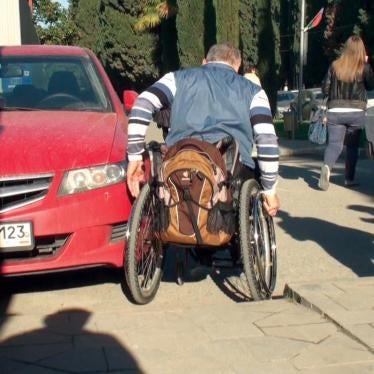(Moscow) – The Russian State Duma should pass amendments that will protect the rights of people with disabilities. The Duma should also introduce further amendments to protect the rights of people with cognitive disabilities and ensure that the disability rights laws are effectively enforced.
The Duma, the lower house of parliament, is scheduled toconsider a series of amendments to 25 federal laws related to disability rights throughout May 2014. The amendments include a prohibition against disability-based discrimination and an expanded list of changes to be made so that public transport and other facilities and services are physically accessible.
“These draft amendments bring Russia one step closer to ensuring that people with disabilities are no longer excluded from society,” said Andrea Mazzarino, Europe and Central Asia disability rights researcher at Human Rights Watch. “The ban on disability-based discrimination helps lay the groundwork for a more inclusive society.”
Russiaratified the United Nations Convention on the Rights of Persons with Disabilities (CRPD) in September 2012. In doing so, it made a commitment to bar discrimination and ensure access for people with disabilities to the physical environment and to services, among other obligations.
The draft amendments detail the kinds of “accommodations” – adaptations to secure accessibility – that many Russians with physical and sensory disabilities need to live independent lives.For example, people who are deaf would have access to automated text messages at train stations with information on schedules, fares, and ticket booth hours. All citizens with disabilities would have unhindered access to polling places, as well as assistance at voting booths, where needed.
However, the draft amendments do not address certain key legislative gaps. Most significantly, they do not revise existing legislation to ensure that people with intellectual, developmental, and psychosocial disabilities benefit from the protections, benefits, and services guaranteed to people with physical and sensory disabilities under the main disability rights law, “On the Social Protection of the Disabled,” and other relevant laws.
“We’ve spoken with children and adults with Down’s syndrome in Russia who were denied the chance to go to mainstream schools by administrators who do not see their potential to learn and who have no legal obligation to include them,” Mazzarino said. “The new amendments should explicitly include accommodations addressing the needs of people with all types of disabilities.”
The draft amendments also lack information about how the government will enforce its accessibility laws. Current laws delegate enforcement to regional and city governments and do not spell out specific mechanisms for making sure the laws are carried out.
As an example, a young man with a physical disability, Nikolai Titkov, remains trapped in his inaccessible apartment in a city just outside Moscow, despite having won a court case in 2012 mandating that city authorities relocate him to an accessible apartment. Human Rights Watch documented this case and other obstacles to accessibility for people with disabilities across Russia in a September 2013 report.
“The antidiscrimination amendment is a big step forward in protecting the rights of Russian citizens with disabilities, but too often, guarantees exist only on paper,” Mazzarino said. “The State Duma should consider additional changes to make sure that disability rights laws have teeth so that people actually benefit from them.”
The amendments under consideration follow a series of important reforms that Russian authorities undertook in 2013 and 2014 to improve the rights of people with disabilities. These reforms include an April 2014 federal order requiring employers to adapt workplaces to the specific needs of employees with disabilities. In February, Moscowauthorities committedto equipping 38 of the city’s metro stations with tactile markers on the edges of train platforms, which help people who are blind and with low vision to locate the platforms’ edges.
In another important move to improve accessibility in transport, the Moscow city government began to implement a GPS data system that would allow blind people to access bus, trolley, and tram schedules and locations on their smartphones in November 2013.
“If the new amendments are implemented properly and expand protections to people with all types of disabilities, they will be another big step in the right direction for disability rights in Russia,” Mazzarino said.
In its September 2013 report, “Barriers Everywhere: Lack of Accessibility for People with Disabilities in Russia,” Human Rights Watch documented barriers faced by people with various types of disabilities in six cities across Russia. Human Rights Watch called on the Russian government to establish meaningful mechanisms to enforce disability rights laws; to ensure the right to accessible infrastructure and services to people with intellectual, developmental, and psychosocial disabilities in its programs and policies; and to explicitly ban discrimination based on disability.







